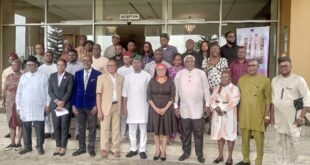… Applauds Proposed Ministry of Blue Economy
By Amos Odhe, Yenagoa
Director General of Ernest Ikoli Visitor Information Centre and immediate past senior special assistant (SSA) to Bayelsa State governor on Tourism, Dr. Piriye Kiyaramo, says Bayelsa, with the longest coastline in the country, offers a wide range of opportunities for the development of blue tourism, being the largest and growing sector of the Blue Economy
Dr. Kiyaramo, who is also chairman, Board of Trustees of BRACED Tourism Promotion & Development Initiative (BTPDI), stated this while exchanging views with travel writers in Yenagoa on Tuesday, adding that Bayelsa presents a rich tapestry of marine biodiversity and captivating coastal landscapes that could attract tourists from all over the world if properly harnessed.
He pointed out that the oil-rich state, which is renowned for its rich underwater cultural heritage, lakes, creeks, mangroves, historic coastal towns and vibrant marine life would transform it to an emerging hub for blue tourism activities such as sailing, yachting, snorkeling, including that of exploring underwater archaeological sites.
While commending Governor Douye Diri for his planned establishment of a new Ministry of Blue Economy during second term in office, Dr. Kiyaramo noted that promoting blue tourism activities will go a long way to protect fragile ecosystems such as seagrass meadows and marine protected areas such as fish sanctuaries, which are usually home to diverse marine species.
Dr. Kiyaramo said the tranquil waters and pristine natural environment the state maritime state provides opportunities for boating, kayaking, and exploring coastal trails, reiterating that the state’s lengthy atlantic coastline also offers unique blue tourism experiences where visitors can witness the breathtaking spectacle of whale and dolphin watching activities at sea.
He further noted that these blue tourism activities will not only create unforgettable memories for visiting tourists but would also foster awareness as well as conservation of these majestic aquatic creatures, stressing that sustainability initiatives in coastal areas needed to focus on reducing environmental impacts, protecting sensitive habitats, and engaging local communities in the preservation of their marine heritage through the new ministry of Blue Economy.
“Bayelsa is renowned for pristine beaches, thriving coral reefs, and rich marine life. It boasts of an extensive coastline with diverse marine ecosystems, providing a plethora of opportunities for blue tourism development,” he said.
According to the governor’s aide, countries like Sir-Lanka have embraced blue tourism with sustainable practices such as whale watching tours that adhere to strict guidelines to avoid disturbing marine life. These eco-conscious experiences highlight the region’s efforts to balance tourism growth with environmental protection.
“South Asia’s blue tourism sector also fosters community involvement and economic empowerment. By promoting sustainable fishing and encouraging local craftsmanship, the industry empowers coastal communities to protect their marine resources while benefiting economically from tourism. Blue tourism experiences in these regions include snorkelling, diving, and sustainable boating, where visitors can witness the beauty of the underwater world responsibly.
“Indeed, blue tourism offers immense benefits for both tourists and the hotel industry. It provides an opportunity for travellers to connect with nature, witness marine biodiversity, and contribute to the preservation of our oceans.
“By embracing sustainable practices, hotels can attract environmentally conscious guests, making a positive environmental impact, generating revenue from new channels, and differentiate themselves in a competitive market.
“As a tourism promoter and travel writer, I encourage tourists to explore the wonders of blue tourism in Bayelsa State as well as become advocates for the protection of our marine environments. I also urge the hotel industry, tourists, investors, and institutions to embrace sustainable practices to create memorable experiences while minimizing their ecological footprint in the destinations they visit,” Dr. Kiyaramo said.
 PH Mundial – Port Harcourt Online Newspaper News Across The Region
PH Mundial – Port Harcourt Online Newspaper News Across The Region





